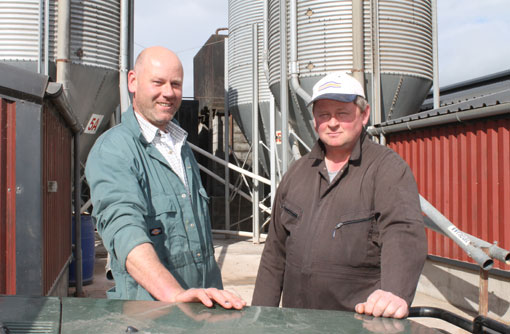Solar photovoltaics provide 55% of farm’s energy needs

The UK’s largest privately-owned solar photovoltaics installation is now generating electricity and earning money for a poultry farmer in west Herefordshire.
The 300kWp roof-mounted system at Roger Bowen’s (pictured (right) with brother Clive) Brooklands Farm features 1,600 solar PV panels covering 2,000sq m of south-facing roof. It will provide 55% of the farm’s annual electricity needs, mainly for heating and ventilating poultry sheds.
Mr Bowen and Clive have been growing broilers at the site for 18 years. Currently there are eight sheds, with another one in construction. When completed, the business will be producing around 270,000 birds a crop for Cargill Meats Europe, based just down the road in Hereford.
“We went for solar partly because it was so easy to get planning permission, but also because it looks like giving us a reasonable return on investment,” Mr Bowen told Poultry World. “We had previously considered installing a wind turbine on the site, but all hell broke loose with the neighbours.”
Mr Bowden worked closely with installation company Southern Solar on the project, who produced the initial feasibility study in the spring of 2010, with a final contract to build the facility signed at the end of December 2010. Planning and design took just over three months, while the building work was completed in just six weeks.
The solar panels – supplied by Sharp Electronics in Wrexham – are secured on five of the poultry sheds’ south-facing roofs, with 320 panels on each roof. Care had to be taken to ensure they were not affected by shadows from the feed bins.
The cost of installation is put at around £2.60-2.80/W – equivalent to about £800,000 – though some additional costs were incurred due to the system’s complexity and short timescale for completion ahead of cuts to the Feed-in Tariff this summer.
“We had to do a lot of strengthening work on the sheds to take the weight,” Mr Bowen explained. High-tensile cables were run between the eaves, in such a way that they would not interfere with the shed cleaners.
Other complications involved accessing some of the sheds, with the installers having to erect scaffolding to get the panels over a building and between some feed bins.
The Bowens also had to put in a new, upgraded transformer and pay for the grid connections.
According to Ben Whittle of Southern Solar, one of the greatest challenges in designing the system was being able to accommodate the peaks and troughs of energy usage on the poultry farm, as the cleaning cycles meant a drop from very high energy use to practically none.
“Sometimes the farm will be importing electricity and sometimes exporting, depending on the stage of the crop,” he said. “With each kWp generating approximately 850kW hours of electricity a year, the local network has to be capable of taking a huge amount of power at times when all the electricity is going into the grid, rather than being used on site.
“The PV system could have a significant effect on local electrical infrastructure and cause problems for other local users if not integrated correctly. This is why we had to upgrade the transformer – to deal with situations like turnaround, when the farm is empty and using almost zero electricity.”
The energy payback is put at around two years, while the whole project is estimated to have paid for itself in nine to 10 years. With the Feed-in Tariff secured at the old, higher rates, the farm will go from having a net energy cost of around £35,000 per annum to a net annual income of around £55,000.
“The Feed-in Tariff is guaranteed for 25 years, and cuts will not be retrospective, so we got in just in time,” said Mr Bowen.
Howard Johns, chairman of the Solar Trade Association and managing director of Southern Solar, said the installation was a good example of how solar PV could benefit UK farmers and help cut carbon emissions.
But these benefits were threatened by the recent cuts to Feed-in Tariffs, which meant projects such as this may not be financially viable for other farmers. “The coalition government needs to acknowledge this and provide a stable Feed-in Tariff regime, so farming and other industries in the UK are able to do the same (as Mr Bowen).”
* For more information, contact the Solar Trade Association email enquiries@solar-trade.org.uk or phone 020 7925 3575
